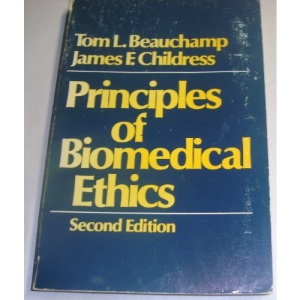Used
Paperback
1989
$3.51
This book first appeared in 1979, and was an attempt to elucidate the underlying principles of medical ethics in non-technical language. Rather than taking a topical approach to ethical issues, the authors systematically analyzed the principles of autonomy, beneficence, nonmaleficence and justice to provide an integrated framework through which diverse moral problems could be handled. For the third edition, the authors have provided new material on autonomy and informed consent, virtue, privacy, supererogation, rationing, death and dying, clinical research, AIDs and many other issues. This text has a sharper clinical focus. Many new cases have been added, and short case vignettes have been woven into the text.
New
Paperback
2008
$67.42
Building on the best-selling tradition of previous editions, Principles of Biomedical Ethics, Sixth Edition, provides a highly original, practical, and insightful guide to morality in the health professions. Acclaimed authors Tom L. Beauchamp and James F. Childress thoroughly develop and advocate for four principles that lie at the core of moral reasoning in health care: respect for autonomy, nonmaleficence, beneficence, and justice. Drawing from contemporary research - and integrating detailed case studies and vivid real-life examples and scenarios - they demonstrate how these prima facie principles can be expanded to apply to various conflicts and dilemmas, from how to deliver bad news to whether or not to withhold or withdraw life-sustaining treatments. Illuminating both theory and method throughout, Principles of Biomedical Ethics, Sixth Edition, considers what constitutes moral character and addresses the problem of moral status: what rights are due to people and animals, and when.
It also examines the professional-patient relationship, surveys major philosophical theories - including utilitarianism, Kantianism, rights theory, and Communitarianism - and describes methods of moral justification in bioethics. Ideal for courses in biomedical ethics, bioethics, and health care ethics, the text is enhanced by hundreds of annotated citations and a substantial introduction that clarifies key terms and concepts.
